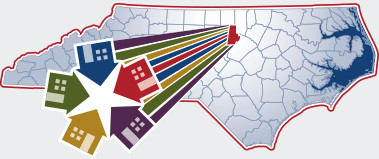Public Housing
Opening Doors with Public Housing
What is the Public Housing Program?
- Directly provides housing of various types for low-income families who qualify.
- Funded by the U.S. Dept. of Housing and Urban Development, administered through Housing Authorities.
Are You Eligible?
- Eligibility is based on your income, family size, disability or elderly status.
- You must be a U.S. citizen or have eligible immigration status.
- You must be 18 or older or emancipated.
- Criminal background is checked by the housing authority but is not automatically disqualifying.
How Do I Apply?
- Waiting lists are maintained at each community's management office.
- Complete application in person at the community where you are interested in residing.
- You will be notified if/when you are placed on the waiting list.
While Waiting for a Unit
- While on the waiting list, keep DHA informed of changes to your address, income and family status.
Selection from the Waiting List
- When your name is selected from the waiting list, DHA will contact you and offer you the opportunity to attend an orientation.
- Before final approval, DHA will verify your income and family composition.
How Is Rent Determined?
- Rent is set to be no more than affordable percentage (usually 30%) of your income.
- There can also be a minimum rent set for those with no income.
How Long Can I Stay?
- In general, you can stay in public housing as long as you meet the terms of you lease, but you will have to re-certify every year that you are still eligible for this housing assistance.
Conventional Public Housing Program
The Conventional Public Housing Program provides quality, safe, affordable housing for low and moderate-income families. Not only does this program assist in the improvement of current housing situations, it also serves as a stepping stone for upward mobility.
After program eligibility is determined, an applicant is placed on a waiting list in accordance with local preference guidelines. Rent is based on 30% of an individual's income, which includes utilities. Currently, public housing is accepting applications. Applications are taken at the community of your choice. Please visit our Communities Map for more information on the various communities we manage.
After a preliminary application is submitted, the applicant will be placed on the waiting list. When the application is pulled, the individual will be invited to an orientation session where a full application will be completed and vital information required such as a picture ID (issued by federal/state or local government), birth certificate, social security card, verification of income among other documents. Once all information is submitted, management will determine if you meet DHA's eligibility criteria, date/time of application and bedroom requirements. Final eligibility is determined immediately prior to the assignment of an apartment.
RAD's Project-Based Rental Assistance (PBRA) Program
The RAD Project-Based Rental Assistance (PBRA) program provides vouchers that are attached to a specific number of units in a building. The voucher stays with the unit even after a tenant moves out. This program assists in the improvement of current housing situations in order to provide quality, safe and affordable housing for low-and moderate-income families. Some PBRA Developments will also have Tax Credit program attached to it. Applicants must meet the Tax Credit income limits as well to be eligible.
Once program eligibility is determined, an applicant will be placed on a waiting list according to date and time of application and bedroom requirements. Final eligibility is determined prior to the assignment of an applicant.
Durham Housing Authority has its Project-Based Rental Assistance communities located throughout Durham: Edgemont Elms; Morreene Road and Damar Court. These communities provide more than 300 dwelling units.
HUD redevelopment grants for Public Housing
Choice Neighborhoods Initiative (CNI) Planning Grant
The U.S. Department of Housing and Urban Development awarded a $300,000 CNI planning grant to the Durham Housing Authority in 2012. The CNI program aims to reduce the spatial concentration of poverty through the revitalization of distressed public, assisted and vacant private housing while leveraging investment in neighborhood resources.
This grant will be leveraged (with cash and in-kind services) to approximately $1 million. It will provide the resources for DHA and its partners to plan the re-development of the Southeast Central area, which includes the McDougald Terrace public housing community. This area is bounded by NC Hwy 147 on the North, Bacon Street on the East, Roxboro Street on the West, and Elmira Avenue on the South. Completed in 1953, McDougald Terrace, with a total of 360 multifamily units, is the largest conventional public housing community in Durham.
The goal of the CNI Planning Grant is to develop a comprehensive Transformation Plan.
Click here for Durham's Transformational Plan (COMING SOON)
Click Here for Additional Attachments (COMING SOON)
Hope VI
HOPE VI is a $35 million revitalization grant to revitalize the Few Gardens public housing complex and surrounding community.
DHA received a HOPE VI Revitalization Grant in the amount of $35,000,000 that made possible the revitalization of the Few Gardens public housing complex and surrounding community. All 240 existing units in Few Gardens have been demolished and will be replaced with 150 units on the original site, including 75 public housing units, 42 tax credit units and 13 market-rate units, as well as homeownership opportunities for 20 public housing and 15 middle income families.
The HOPE VI revitalization plan will also help strengthen the surrounding community by developing 260 units in three adjacent neighborhoods, including 85 public housing rentals, 46 tax credit rental, 14 market rate and 115 homeownership units for 60 public housing and 55 middle income families.
With access to more than 20 local partners, including the Center for Employment and Training, North Carolina Central University and local employers such as GlaxoSmithKline, Durham Public Schools, and IBM, Residents will gain the skills they need to tap into the economic growth area. Durham's HOPE VI Grant has leveraged millions of dollars in public and private funds.


